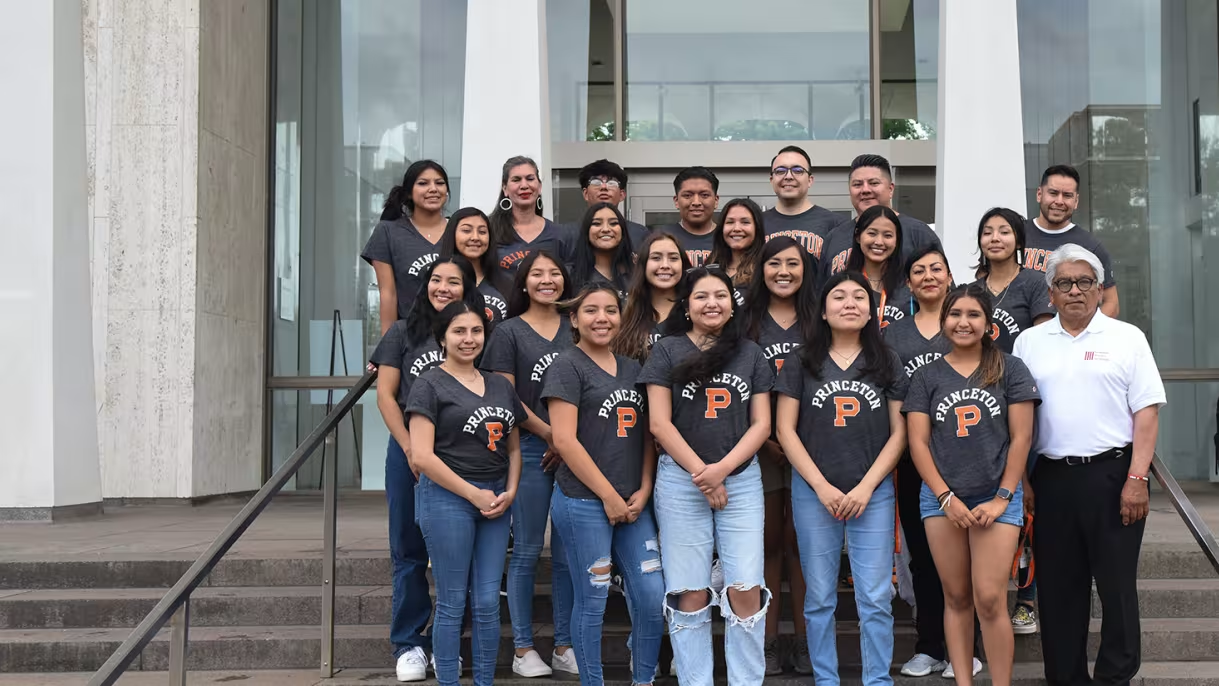
The Santa Fe Indian School Leadership Institute’s Summer Policy Academy (SPA) returned to Princeton University as part of a program that exposes high school students and recent graduates of Pueblo and Navajo nations to the power of public policy and law.
The agenda included lectures and presentations exploring the last 100 years of federal policies and laws to help students “become familiar with the history and policies and laws that have been conceived to destroy their systems and institutions,” said Regis Pecos, a member of Princeton’s Class 1977 who founded SPA and is co-director.
Pecos is a former Princeton trustee, former chief of staff to the speaker of the New Mexico House of Representatives, and former director of policy and legislative affairs for the New Mexico Office of the Majority Floor Leader.
“We hope our young people are inspired by this experience and motivated to pursue careers in public service and in policymaking,” Pecos said. “We try to create an opportunity for them to have an epiphany of appreciating who they are, the richness that comes with their language and culture, and their way of life. For many generations, the conditioning has been that in order to be successful, you have to compromise that half of your identity.”
This year’s SPA, which had 17 students, was held from June 11 to 17 and funded and organized by Princeton’s Office of Institutional Equity & Diversity.
"Princeton has developed relationships with a range of local and national programs focused on addressing disparities in access to selective universities and combating systemic racism. We also value the opportunity to partner with programs that center Native/Indigenous communities," said Kevin Hudson, associate director for diversity and college opportunity. “The Office of Institutional Equity & Diversity was honored to host this year's academy.”
SPA has a strong, historical relationship with the Princeton School of Public and International Affairs (SPIA), which sponsored the academy in past years. Pecos was eager to work with Dean Amaney Jamal this year, especially given her strategic focus on diversity, equity, and inclusion (DEI). He said many of the students felt an immediate connection to Dean Jamal formed through shared life experiences and indigenous languages.
“Meeting the talented SPA cohort was both energizing and inspiring, as we spoke about the many paths one can take to public policy and public service," Jamal said. "It was such a joy to have them be part of our Princeton community, welcome the cohort to our campus, and exchange greetings and introductions in indigenous languages.”
The program also brought together several campus administrators to engage the SPA cohort about selective postsecondary pathways. The workshop, facilitated by Hudson, was attended by Brittany Johnson, associate dean for diversity and outreach, Office of Undergraduate Admission; Renita Miller, associate dean for access, diversity, and inclusion, Office of the Dean of the Graduate School; and Steven Petric, director of admission at SPIA. Participants from the Junior Summer Institute, another summer program at SPIA, joined the SPA group, which was facilitated by Laura de Olden, associate director of graduate student life and diversity at SPIA.
One of the main themes for this year’s SPA centered on the Yazzie/Martinez v. State of New Mexico decision, in which families and school districts sued the New Mexico Public Education Department and the state legislature for failing to provide students — particularly low-income, Native American, English language learner, and students with disabilities — the programs and services necessary for them to learn and thrive.
“I’m most interested in advocating for Native American students in New Mexico and the type of education we receive,” said Taryn Aguilar, a recent graduate of Santa Fe Indian School participating in this year’s SPA. “I really think the education in New Mexico lacks certain requirements that really need to be focused on.”
Aguila will be attending Sul Ross State University in Alpine, Texas, this fall, majoring in political science, and hopes her participation in SPA will give her powerful tools and knowledge to take with her not only to college but beyond. She plans to continue her education at the University of New Mexico School of Law.
Many of the SPA students consider themselves strong advocates for education and for a better future for those who follow in their footsteps.
“Native American women face struggles every day, not only in everyday living but in education and in the world that we have adapted to,” Leah Mountain said. “I came from a Westernized school where I personally experienced racism and stereotyping. I don’t want anybody else to feel that way. With education comes with responsibility, not only for myself but for my parents and our tribal leaders, along with our New Mexico delegation.”
These are issues that are also near to the heart of Casey Douma, an attorney who predominately works with tribal governments, tribal entities, and tribal nations. He is also one of the longest-running faculty members of the SPA program. Many of the students who come through the program, Douma said, have “a heart that is dedicated to the service of their people.” The role of the SPA program, he said, is to give them the skills necessary to uplift their communities.
“Many times, the expectation is that our young people have to wait until they get older to contribute to their communities, but, as a foundational principle of the Summer Policy Academy, we encourage them that they are leaders today,” he said. “Why wait for tomorrow for the things that they can do today?”
What keeps Douma returning to the program is the inspiration that comes from witnessing the students’ journeys through education, as they enter become influential leaders in their own communities and abroad. Douma compares this effect of the SPA program to the planting and farming culture of his homeland.

